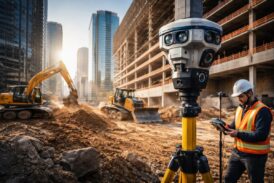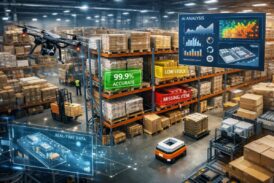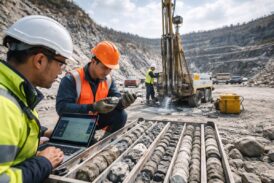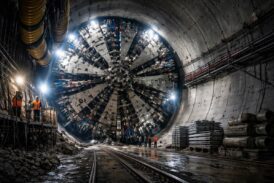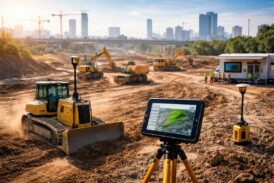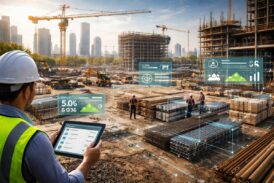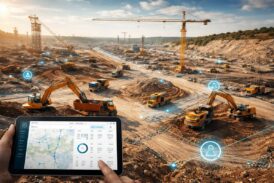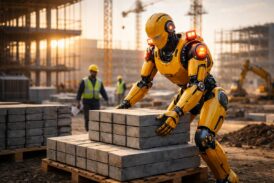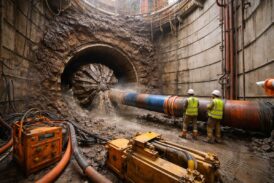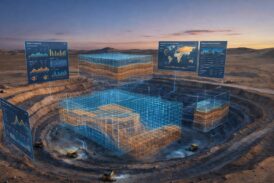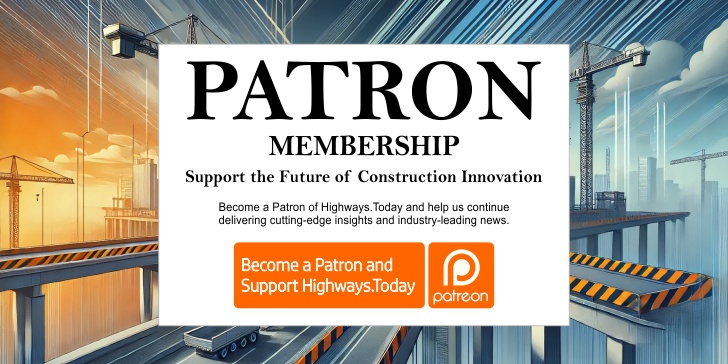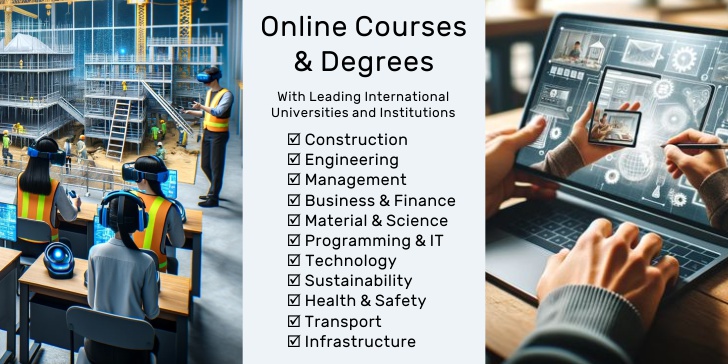
Smart Construction Month
This month, we are thrilled to spotlight the latest advancements and cutting-edge technologies revolutionizing the construction industry. As the backbone of modern infrastructure, construction plays a critical role in shaping the world around us.
We will delve into the innovations driving this field forward, from ground-breaking materials and sustainable practices to smart technologies and automation. Our focus is to explore how these advancements are not only enhancing efficiency and safety but also paving the way for a more resilient and sustainable future.
At Highways.Today, we believe that staying ahead of the curve is essential for professionals in the construction sector. Throughout this month, we will feature dedicated articles, insightful features, and detailed case studies that highlight the transformative power of technology in construction. Whether you’re an industry veteran or a newcomer, our comprehensive coverage will provide you with valuable knowledge and inspiration to help you navigate and thrive in this rapidly evolving landscape.
Join us as we celebrate the ingenuity and innovation that continue to drive the construction industry forward.

Top Trends in Smart Construction
As we embark on Construction Technologies & Innovations Month at Highways.Today, we are excited to explore the forefront of advancements that are shaping the future of the construction industry. The rapid pace of technological innovation is transforming how we design, build, and maintain our infrastructure.
From digital modelling to sustainable materials, each breakthrough is a step toward a more efficient, safe, and sustainable built environment. This comprehensive overview of the top 12 trends will provide you with insights into the technologies driving these changes and how they are revolutionizing the construction landscape.
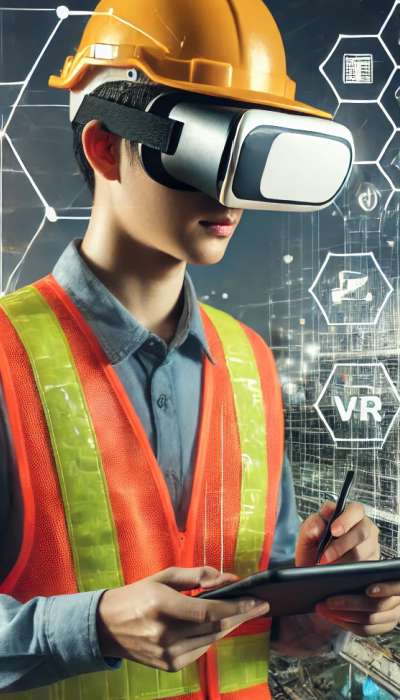

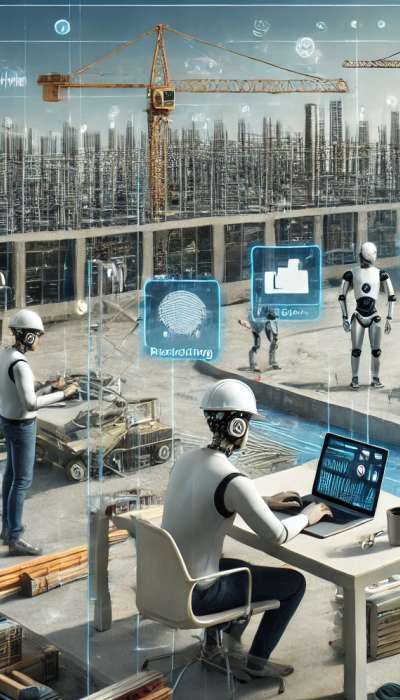
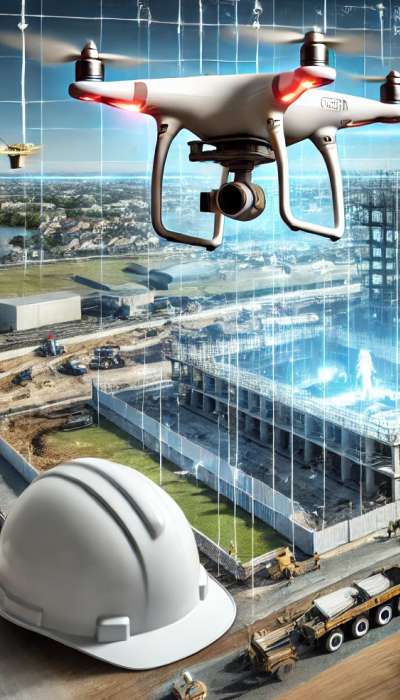

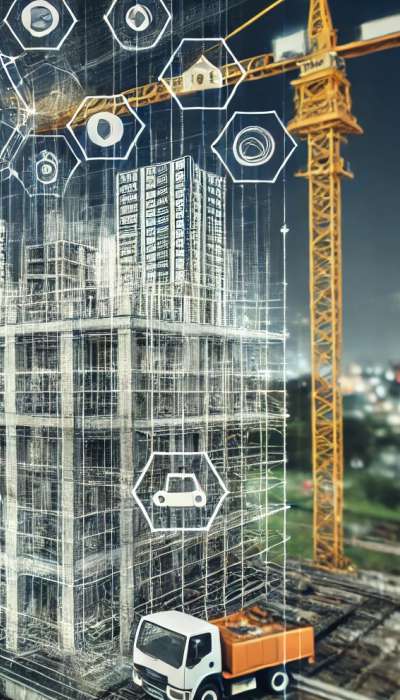
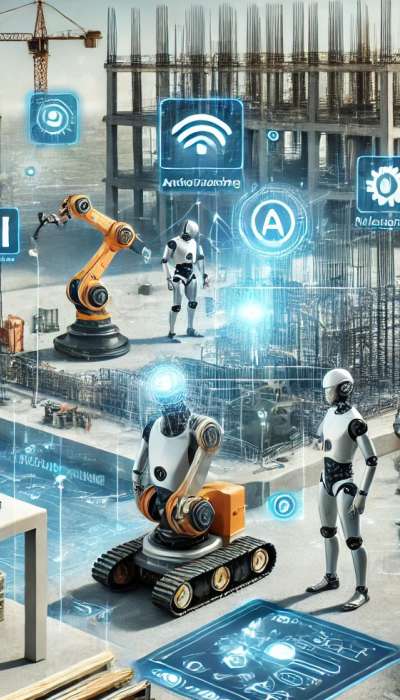


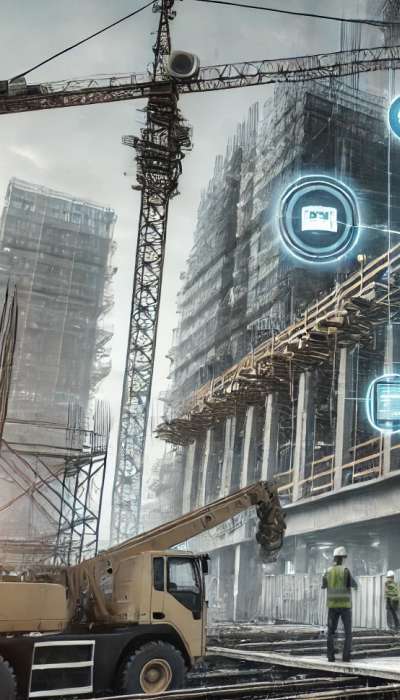


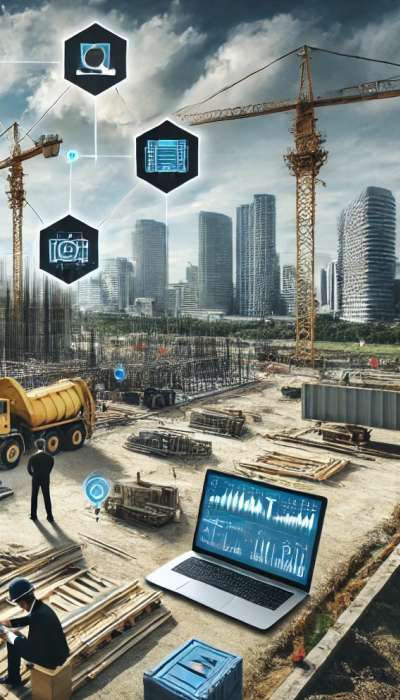
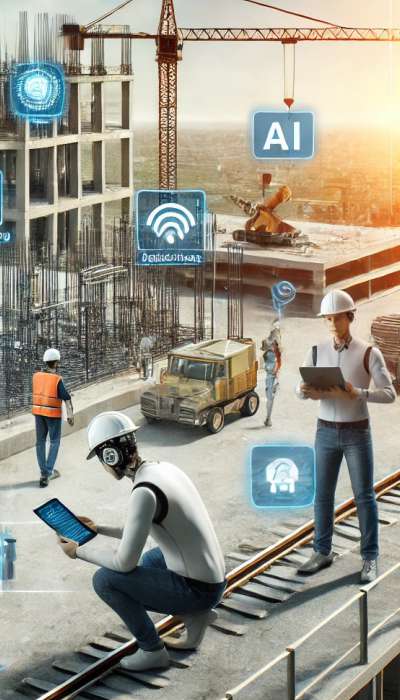
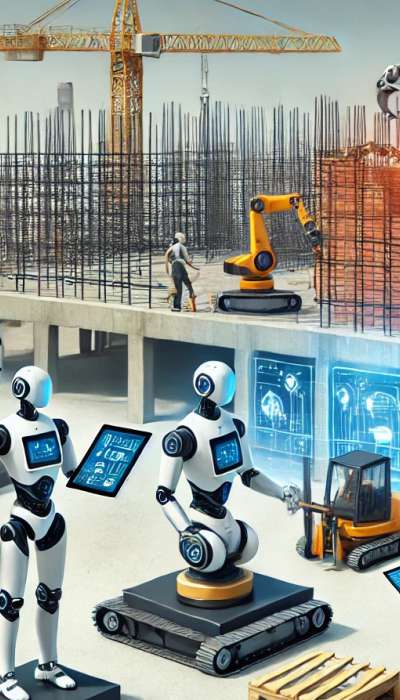
Digitization and Digital Twins
Digitization is driving a fundamental transformation in the construction industry by enabling the seamless integration of digital technologies across all phases of the project lifecycle. This shift involves the adoption of digital tools and platforms for project management, design, and collaboration. For example, cloud-based project management software allows teams to share and access information in real-time, improving communication and coordination. Digital workflows streamline processes, reduce paperwork, and enhance data accuracy, leading to better project outcomes.
Digital twins represent one of the most advanced applications of digitization in construction. A digital twin is a dynamic, digital representation of a physical asset, such as a building or infrastructure, that uses real-time data from IoT sensors to mirror the asset’s condition and performance. This virtual model allows for continuous monitoring, simulation, and analysis, enabling predictive maintenance and informed decision-making. Digital twins can identify potential issues before they become critical, optimize energy usage, and extend the lifespan of the asset. By leveraging digitization and digital twin technology, the construction industry can achieve unprecedented levels of efficiency, sustainability, and resilience.
Building Information Modelling (BIM)
Building Information Modelling (BIM) is transforming the construction industry by enabling the creation of highly detailed digital representations of buildings and infrastructure. These models integrate data from various disciplines, including architecture, engineering, and construction, allowing for enhanced collaboration and coordination among stakeholders. BIM facilitates better decision-making throughout the project lifecycle by providing accurate and up-to-date information on design, materials, and schedules. Moreover, the ability to simulate construction processes and detect potential issues before they arise significantly reduces errors and rework, leading to cost savings and improved project outcomes.
One of the key advantages of BIM is its ability to support sustainable construction practices. By analysing energy performance, material usage, and environmental impact within the model, project teams can make informed choices that reduce the carbon footprint and enhance the overall sustainability of the project. Additionally, BIM’s integration with other technologies such as GIS (Geographic Information Systems) and IoT (Internet of Things) allows for real-time monitoring and maintenance of buildings, extending the value of the model beyond construction and into the operational phase.
Artificial Intelligence and Machine Learning
Artificial Intelligence (AI) and Machine Learning (ML) are revolutionizing the construction industry by enabling predictive analytics, optimizing project management, and enhancing decision-making. AI algorithms can analyse vast amounts of data from various sources, such as project plans, site conditions, and historical performance, to identify patterns and make predictions about project outcomes. This capability allows construction managers to anticipate potential issues, such as delays or cost overruns, and take proactive measures to mitigate risks. Additionally, AI-powered tools can optimize resource allocation, ensuring that labour, materials, and equipment are used efficiently.
Machine learning, a subset of AI, is particularly valuable for improving the accuracy of predictions and recommendations over time. By continuously learning from new data, ML algorithms can refine their models and provide more precise insights into project performance. For example, machine learning can be used to analyze sensor data from construction equipment to predict maintenance needs, reducing downtime and extending the lifespan of machinery. Furthermore, AI and ML can enhance safety by analyzing site data to identify hazardous conditions and recommending preventive measures. As these technologies continue to evolve, their integration into construction processes is expected to drive significant improvements in efficiency, safety, and overall project success.
Augmented Reality (AR) and Virtual Reality (VR)
Augmented Reality (AR) and Virtual Reality (VR) are transforming the way construction projects are designed, planned, and executed. AR overlays digital information onto the physical environment, allowing stakeholders to visualize and interact with 3D models and design elements in real-time. This technology enables architects, engineers, and clients to explore different design options, identify potential issues, and make informed decisions early in the project lifecycle. By providing a clear and immersive representation of the project, AR enhances communication and collaboration among team members, reducing misunderstandings and ensuring alignment on project goals.
Virtual Reality (VR) takes this a step further by creating fully immersive environments that simulate the construction site. VR can be used for a variety of applications, including design reviews, safety training, and construction planning. For example, VR allows project teams to conduct virtual walkthroughs of the site, identifying potential hazards and optimizing construction sequences before physical work begins. This proactive approach to planning and risk management can significantly improve project outcomes and reduce costly delays. Additionally, VR-based training programs can provide workers with hands-on experience in a safe and controlled environment, enhancing their skills and preparedness for real-world tasks
Drones and Aerial Imaging
Drones and aerial imaging technology has become indispensable in the construction industry. Drones equipped with cameras and sensors capture detailed aerial images and videos of construction sites, providing valuable data for site analysis, progress monitoring, and inspection. These aerial perspectives enable project managers to identify potential issues, track construction progress, and ensure compliance with design specifications, all from a remote location. The ability to conduct frequent and comprehensive site surveys enhances decision-making and improves project management.
Beyond imaging, drones are also being used for tasks such as topographic mapping, volumetric measurements, and thermal imaging. By creating accurate 3D models and maps of the construction site, drones help in planning and optimizing site layouts, identifying potential hazards, and ensuring efficient use of resources. Thermal imaging capabilities allow for the detection of heat loss, moisture intrusion, and other issues that are not visible to the naked eye. As drone technology continues to advance, its applications in construction are expected to expand, offering even more sophisticated tools for enhancing efficiency and safety.
Smart Construction Wearables
Smart construction wearables are enhancing worker safety and productivity. These devices, which include smart helmets, vests, and glasses, are equipped with sensors and communication tools that monitor vital signs, detect hazards, and provide real-time information to workers and supervisors. For example, smart helmets can monitor a worker’s heart rate, body temperature, and exposure to harmful substances, alerting them to potential health risks and ensuring timely intervention. This proactive approach to safety helps prevent accidents and reduces the risk of injury on construction sites.
In addition to safety, smart wearables also improve productivity by facilitating better communication and data sharing. Smart glasses, for instance, can overlay digital information onto the physical environment, providing workers with detailed instructions, schematics, and real-time updates without the need to refer to paper documents or handheld devices. This hands-free access to information enhances efficiency and accuracy, allowing workers to focus on their tasks. As wearable technology continues to evolve, its integration into the construction industry is expected to bring even greater advancements in safety, productivity, and overall project performance.
Sustainable Construction Materials
Sustainable construction materials are at the forefront of the industry’s efforts to reduce environmental impact and promote long-term resilience. Innovations such as recycled steel, bamboo, and self-healing concrete are gaining popularity due to their ecological benefits and superior performance. Recycled steel, for example, not only conserves natural resources but also requires less energy to produce compared to traditional steel. Bamboo, known for its rapid growth and strength, offers a renewable alternative to conventional timber, making it an excellent choice for sustainable building practices.
Self-healing concrete is another ground-breaking material that addresses one of the major issues in construction: the deterioration of concrete structures. This innovative material contains bacteria or other agents that activate when cracks form, producing limestone to fill the gaps and restore the integrity of the concrete. This not only extends the lifespan of the structure but also reduces maintenance costs and resource consumption over time. By adopting these, the construction industry is moving towards a more eco-friendly and durable built environment.
Prefabrication and Modular Construction
Prefabrication and modular construction techniques are revolutionizing the way buildings are designed and constructed. By manufacturing building components off-site in controlled environments, these methods ensure higher quality control, reduce waste, and shorten construction timelines. Prefabrications can range from simple wall panels to complex mechanical systems, all of which are transported to site for quick assembly. This approach minimizes disruptions and accelerates project completion, making it particularly advantageous for projects in urban areas with limited space and strict timelines.
Modular construction takes prefabrication a step further by assembling entire building sections or modules off-site. These modules are fully outfitted with electrical, plumbing, and finishing elements before being transported to the construction site. Once there, they are quickly assembled into a cohesive structure. This method offers significant benefits in terms of speed, cost, and flexibility. Modular construction is particularly well-suited for repetitive structures such as hotels, hospitals, and apartment buildings, where standardized modules can be efficiently produced and assembled. Additionally, the ability to disassemble and relocate modules provides an adaptable solution for temporary or evolving needs.
3D Printing
3D printing technology is pushing the boundaries of traditional construction methods by enabling the creation of complex structures with precision and minimal waste. This technology uses digital models to produce building components layer by layer, using materials such as concrete, plastics, and even metal. One of the key advantages of 3D printing in construction is its ability to produce custom components quickly and cost-effectively, making it ideal for projects that require unique designs or rapid prototyping. Additionally, the precision of 3D printing reduces material waste and enhances the sustainability of construction processes.
One of the most promising applications of 3D printing in construction is the creation of entire buildings. Large-scale 3D printers can construct walls, foundations, and other structural elements on-site, significantly reducing construction time and labour costs. This method has already been used to build houses, bridges, and other infrastructure, demonstrating its potential to revolutionize the industry. As the technology continues to develop, it will enable the construction of more complex and larger-scale projects, further enhancing efficiency and innovation in the construction sector.
Internet of Things (IoT)
The Internet of Things (IoT) is revolutionizing construction by connecting equipment, materials, and workers through a network of smart devices and sensors. IoT enables real-time monitoring and control of various aspects of the construction process, improving efficiency, safety, and resource management. For example, IoT sensors can track the location and status of equipment and materials, ensuring that they are used effectively and reducing the risk of theft or loss. Additionally, IoT devices can monitor environmental conditions, such as temperature and humidity, providing valuable data for optimizing construction processes and ensuring the quality of materials.
One of the most promising applications of IoT in construction is the concept of digital twins. A digital twin is a virtual replica of a physical asset, such as a building or infrastructure, that is continuously updated with data from IoT sensors. This digital representation allows project teams to monitor the performance and condition of the asset in real-time, identifying potential issues and optimizing maintenance activities. Digital twins can also be used for simulation and analysis, enabling predictive maintenance and enhancing decision-making throughout the asset’s lifecycle. By integrating IoT and digital twin technologies, the construction industry can achieve greater efficiency, sustainability, and resilience.
Equipment Machine Control, Automation, and Telematics
Equipment machine control and automation are revolutionizing construction operations by enhancing precision, efficiency, and safety. Advanced machine control systems use GPS, sensors, and 3D modelling to guide construction equipment, ensuring that tasks such as grading, excavation, and paving are performed with high accuracy. These systems reduce the need for manual intervention and rework, resulting in faster project completion and cost savings. Automation extends to autonomous construction vehicles that can operate with minimal human supervision, further increasing productivity and reducing the risk of accidents.
Telematics, the integration of telecommunications and information technology, is transforming equipment management by providing real-time data on equipment performance, location, and utilization. Telematics systems collect and transmit data from construction equipment to centralized platforms, enabling project managers to monitor equipment health, optimize maintenance schedules, and track fuel consumption. This data-driven approach enhances decision-making, reduces downtime, and extends the lifespan of equipment. By leveraging machine control, automation, and telematics, construction companies can achieve higher levels of efficiency, safety, and profitability.
Robotics and Automation
Robotics and automation are transforming construction sites by taking over repetitive and labour-intensive tasks, leading to increased efficiency and reduced risk of injuries. Construction robots, such as bricklaying robots and autonomous construction vehicles, can perform tasks with high precision and speed, significantly reducing the time and labour required for certain activities. For example, bricklaying robots can lay bricks faster and more accurately than human workers, ensuring consistent quality and reducing the need for rework. Similarly, autonomous construction vehicles can transport materials and perform earthmoving tasks without human intervention, improving safety and efficiency.
Automation extends beyond physical robots to include automated processes and systems that streamline various aspects of construction project management. For instance, automated scheduling and project management software can optimize resource allocation, track progress, and identify potential delays, ensuring that projects stay on track and within budget. Additionally, automation can improve quality control by monitoring construction activities and identifying deviations from design specifications in real-time. By integrating robotics and automation into construction processes, the industry can achieve higher levels of productivity, quality, and safety.
The construction industry is undergoing a profound transformation driven by technological innovation and digital integration. These top 12 trends represent the forefront of this evolution, offering solutions that enhance efficiency, safety, and sustainability. From advanced modelling techniques and sustainable materials to robotics and IoT, each trend brings unique benefits that collectively revolutionize the way we build and maintain our infrastructure.
As we continue to explore and adopt these innovations, the construction industry will be better equipped to meet the challenges of the future and build a resilient, sustainable world for generations to come.

Featured Smart Construction Articles
Read more Technology News.

Leading Companies in Smart Construction
The rapid pace of technological innovation is transforming how we design, build, and maintain our infrastructure. From digital modelling to sustainable materials, each breakthrough is a step toward a more efficient, safe, and sustainable built environment.
This overview of the top companies leading the charge in construction technologies and innovations will provide you with insights into the cutting-edge solutions driving these changes and how they are revolutionizing the construction landscape.



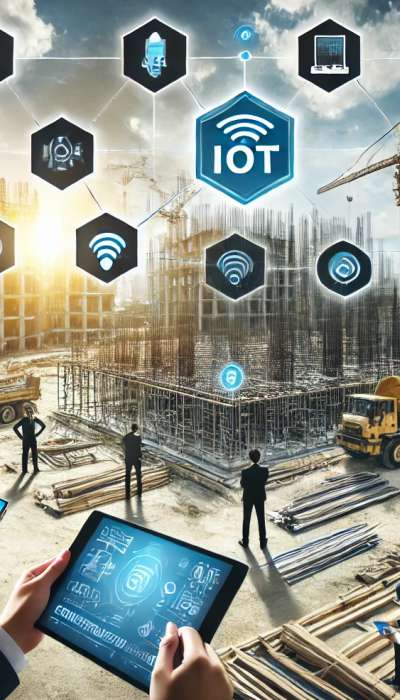
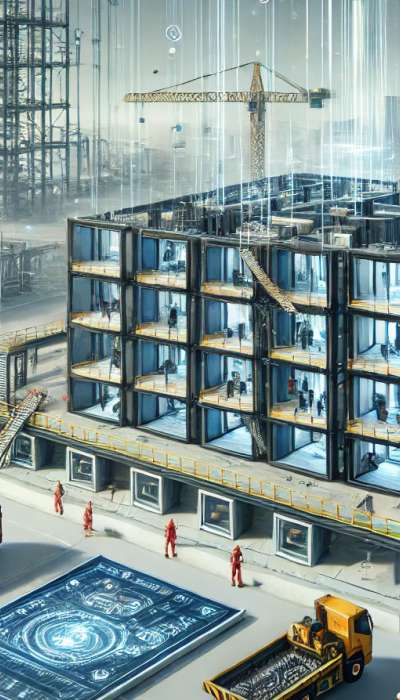

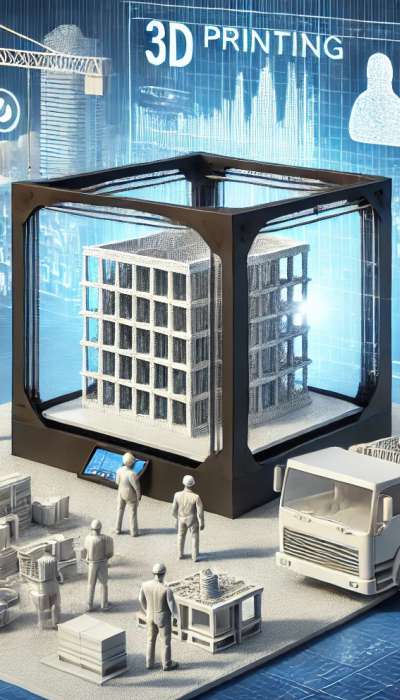
Autodesk, Inc.
Autodesk is a global leader in software for architecture, engineering, and construction. Their flagship product, Revit, is widely used for Building Information Modeling (BIM), enabling enhanced design, planning, and management of construction projects.
Trimble Inc.
Trimble provides advanced positioning and geospatial solutions, including GPS, laser, and optical technologies. Their products are integral to site positioning systems, machine control, and BIM solutions, facilitating precision and efficiency in construction.
Caterpillar Inc.
Caterpillar is a leading manufacturer of construction and mining equipment, known for innovative machine control and automation systems. Their Cat Connect technology includes telematics, fleet management, and equipment health monitoring.
Komatsu Ltd.
Komatsu offers a range of construction machinery and innovative solutions such as intelligent machine control and autonomous haulage systems. Their Smart Construction solutions integrate IoT and telematics to enhance site efficiency and safety.
Hexagon AB
Hexagon provides digital reality solutions and autonomous technologies. Their offerings include advanced sensors, software, and autonomous solutions that improve productivity and safety in construction and infrastructure projects.
Topcon Positioning Systems, Inc.
Topcon specializes in positioning technology and smart infrastructure solutions. Their products include GNSS systems, machine control, and UAV solutions that support accurate site measurement and construction management.
Siemens AG
Siemens offers a range of solutions for smart infrastructure and construction, including building automation, digital twins, and energy management. Their comprehensive approach integrates IoT and AI to enhance building efficiency and sustainability.
Putzmeister
Putzmeister is renowned for its concrete pumping and placement equipment. Their innovative machinery and solutions improve the efficiency and quality of concrete construction projects worldwide.
Procore Technologies, Inc.
Procore provides a comprehensive construction management platform that streamlines project management, collaboration, and documentation. Their cloud-based software enhances productivity and project visibility for construction professionals.
Kiewit Corporation
Kiewit is a major construction and engineering company known for its innovative construction methods and use of advanced technologies. Their expertise spans various sectors, including transportation, power, and industrial construction.
Leica Geosystems AG
Leica Geosystems, part of Hexagon, offers high-precision measurement and surveying solutions. Their products include laser scanners, GNSS systems, and total stations that support accurate site assessment and construction management.
Hilti Corporation
Hilti is a leading provider of tools, technologies, and software for the construction industry. Their innovations include advanced drilling, cutting, and fastening solutions, as well as digital services that improve job site productivity and safety.
Bluebeam, Inc.
Bluebeam develops innovative software solutions for the architecture, engineering, and construction industries. Their Revu software enhances project communication and collaboration through advanced PDF creation, editing, and markup tools.
Bosch Rexroth AG
Bosch Rexroth provides drive and control technologies that improve the efficiency and precision of construction machinery. Their solutions include hydraulic systems, electric drives, and IoT-enabled components for smart construction equipment.
Dassault Systèmes SE
Dassault Systèmes offers 3DEXPERIENCE, a platform that integrates 3D design, simulation, and information management for construction projects. Their solutions enable the creation of digital twins and support sustainable construction practices.
Iteris, Inc.
Iteris specializes in smart transportation infrastructure solutions. Their technologies include advanced sensors, data analytics, and software that improve traffic management, road safety, and infrastructure efficiency.
WJ Group
WJ Group provides innovative geotechnical solutions and services, including ground engineering, soil stabilization, and foundation systems. Their expertise supports complex construction projects in challenging environments.
Esri
Esri is a leader in geographic information system (GIS) technology. Their ArcGIS platform is widely used for spatial analysis, mapping, and data visualization in construction, enabling better planning, design, and management of infrastructure projects.
Cincoze
Cincoze offers rugged computing solutions for industrial applications, including construction. Their robust hardware is designed to withstand harsh environments and support advanced technologies such as IoT and AI in construction operations.
DJI
DJI is a leading manufacturer of drones and aerial imaging technology. Their advanced UAVs are widely used in construction for site surveys, progress monitoring, and inspections. DJI’s high-resolution cameras and sensors provide valuable data that enhance project planning, safety, and efficiency.
The construction industry is undergoing a profound transformation driven by technological innovation and digital integration. These top 20 companies are at the forefront of this evolution, offering solutions that enhance efficiency, safety, and sustainability. From advanced modelling techniques and sustainable materials to robotics and IoT, each company brings unique innovations that collectively revolutionize the way we build and maintain our infrastructure.
As we continue to explore and adopt these innovations, the construction industry will be better equipped to meet the challenges of the future and build a resilient, sustainable world for generations to come.

Leading Smart Construction Resources
Staying informed about the latest trends and innovations in construction technology is crucial for professionals looking to lead and excel in the industry. As Construction Technologies & Innovations Month unfolds, we are excited to present a curated list of the top 20 information and knowledge resources. These platforms provide comprehensive coverage, expert insights, and valuable tools to help you navigate the rapidly evolving landscape of construction technologies and innovations.
Whether you are seeking news, technical articles, research reports, or best practices, these resources will equip you with the information needed to stay ahead of the curve and drive progress in your projects and organizations.


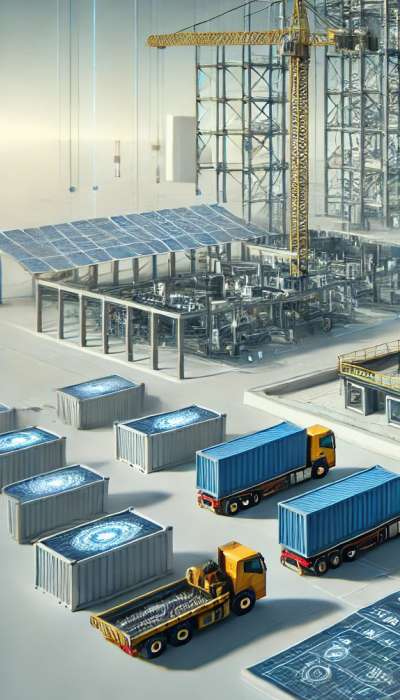

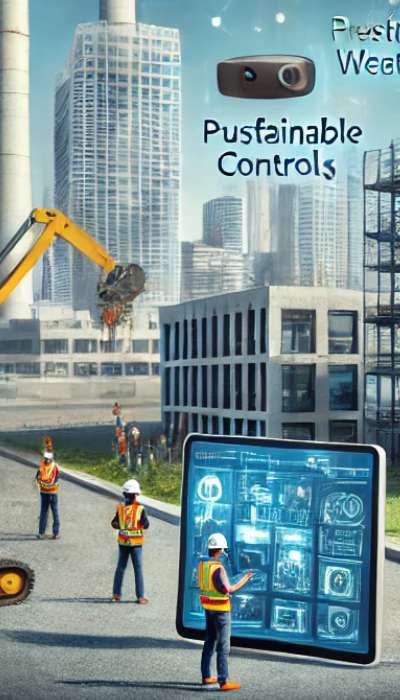


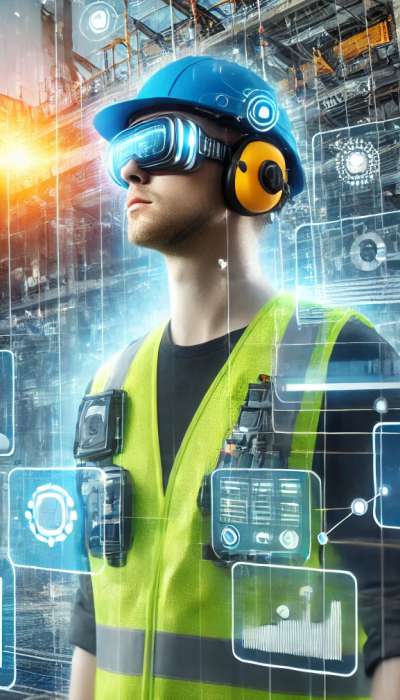
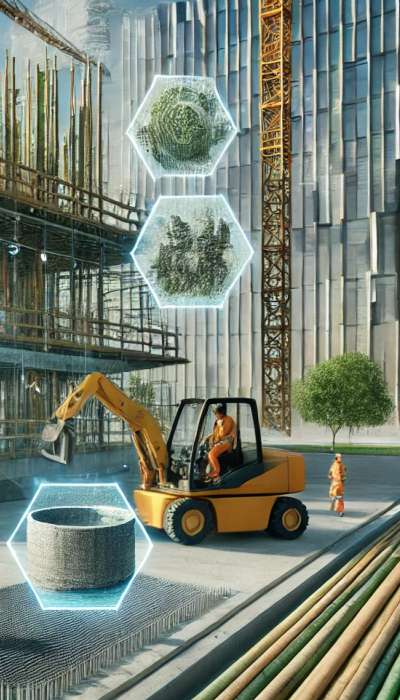
Highways.Today
Highways.Today is the premier online resource offering news, insights, and updates on the latest advancements in highway and general construction, infrastructure, and all the associated technology. We strive to bring you on-going and comprehensive coverage including articles, case studies, and expert opinions on the latest emerging trends and best practices.
Construction Management Association of America (CMAA)
CMAA provides resources, education, and certification programs for construction management professionals. Their offerings include industry news, technical articles, and best practice guidelines.
American Concrete Institute (ACI)
ACI provides technical resources, certification programs, and research on concrete technology and construction practices. Their publications include journals, standards, and guides for concrete construction.
Royal Institution of Chartered Surveyors (RICS)
RICS offers resources and research on construction and built environment topics, including technology, sustainability, and project management. Their publications include journals, reports, and best practice guidelines.
National Institute of Building Sciences (NIBS)
NIBS provides resources and research on building science and technology. Their offerings include publications, webinars, and conferences on topics such as BIM, sustainability, and building performance.
Construction Innovation Hub
The Construction Innovation Hub focuses on advancing innovation in the construction industry through research, collaboration, and knowledge sharing. Their resources include reports, case studies, and insights into the latest technological advancements.
European Construction Technology Platform (ECTP)
ECTP promotes research and innovation in the construction industry across Europe. Their resources include project reports, research publications, and information on funding opportunities for construction technology initiatives.
Construction Industry Institute (CII)
CII is a consortium of leading owners, contractors, and academics who collaborate to advance the construction industry through research and best practices. Their resources include extensive research reports, implementation guides, and training programs.
European Construction Technology Platform (ECTP)
ECTP promotes research and innovation in the construction industry across Europe. Their resources include project reports, research publications, and information on funding opportunities for construction technology initiatives.
Australian Sustainable Built Environment Council (ASBEC)
ASBEC is a collective of industry and government organizations committed to a sustainable built environment in Australia. Their resources include policy advocacy, research reports, and best practice guidelines.
Canadian Construction Innovations (CCI)
CCI is an organization that promotes innovation in the Canadian construction industry. They support research and development, facilitate collaboration, and provide resources on new construction technologies and practices.
Building Research Establishment (BRE)
BRE is a UK-based organization providing research, consultancy, and testing services for the built environment. Their resources include publications, training, and certification programs on sustainable construction and building performance.
Federal Highway Administration (FHWA)
The Federal Highway Administration supports US state and local governments in the design, construction, and maintenance of the nation’s highway system. Their programs include research, funding, and technical assistance for innovative highway construction technologies.
International Code Council (ICC)
The International Code Council develops model building codes and standards used in the design, build, and compliance processes to construct safe, sustainable, and affordable structures. Their resources include code books, training, and certification programs.
U.S. Department of Energy (DOE) – Building Technologies Office (BTO)
The U.S. Department of Energy – Building Technologies Office works to improve the energy efficiency of buildings in the US. Their programs and resources focus on advancing building technologies, promoting energy-efficient construction practices, and supporting research and development.
National Institute of Standards and Technology (NIST)
Engineering Laboratory NIST’s Engineering Laboratory conducts research to advance the nation’s infrastructure, improve building materials and construction techniques, and enhance building performance and safety.
Hong Kong Construction Industry Council (CIC)
CIC promotes sustainable growth and development in the construction industry in Hong Kong. Their initiatives include research, training, and the promotion of innovative construction methods and technologies.
Singapore Building and Construction Authority (BCA)
BCA champions the development of an excellent built environment in Singapore. Their programs focus on green building, construction productivity, and digitalization in construction.
Japan Construction Information Center (JACIC)
JACIC provides information and services to support the construction industry in Japan. Their resources include databases, research, and technical support on construction technologies and best practices.
Swedish Construction Federation (BI)
BI is a trade organization representing the Swedish construction industry. They provide resources on construction technologies, sustainability, and best practices, and advocate for industry development and innovation.
Construction Scotland Innovation Centre (CSIC)
CSIC supports innovation in the Scottish construction industry through research, collaboration, and technology development. Their resources include innovation support, training, and access to state-of-the-art facilities.
India Construction Industry Development Council (CIDC)
CIDC is an organization that promotes the growth and development of the construction industry in India. Their initiatives include training, research, and the promotion of best practices and new technologies.
China Academy of Building Research (CABR)
CABR is a leading research institution in China dedicated to the study of building science and technology. Their work includes research, standardization, and the development of new construction technologies.
European Union – Horizon 2020 Program
Horizon 2020 is the EU’s largest research and innovation program, providing funding for projects that advance science and technology. It includes initiatives focused on sustainable construction and building technologies.
German Federal Institute for Materials Research and Testing (BAM)
BAM conducts research and testing to ensure the safety and reliability of materials and structures. Their work supports the development of innovative construction materials and methods.
The construction industry is undergoing a profound transformation driven by technological innovation and digital integration. These top 20 information and knowledge resources provide comprehensive coverage, expert insights, and valuable tools to help you navigate the evolving landscape of construction technologies and innovations.
Whether you’re seeking news, technical articles, research reports, or best practices, these resources offer the information you need to stay ahead of the curve and drive progress in your projects and organizations. As we continue to explore and adopt these innovations, the construction industry will be better equipped to meet the challenges of the future and build a resilient, sustainable world for generations to come.

Leading Smart Construction Events
Attending industry events is essential for staying updated on the latest trends and innovations in construction technology. These events offer invaluable opportunities for learning, networking, and discovering new products and solutions that are shaping the future of construction. From international trade fairs to specialized conferences, these gatherings bring together industry leaders, innovators, and professionals to share insights, explore advancements, and foster collaboration.
Here is a curated list of the top 20 events, including exhibitions, conferences, and forums, that provide comprehensive coverage and opportunities in the realm of construction technologies and innovations.

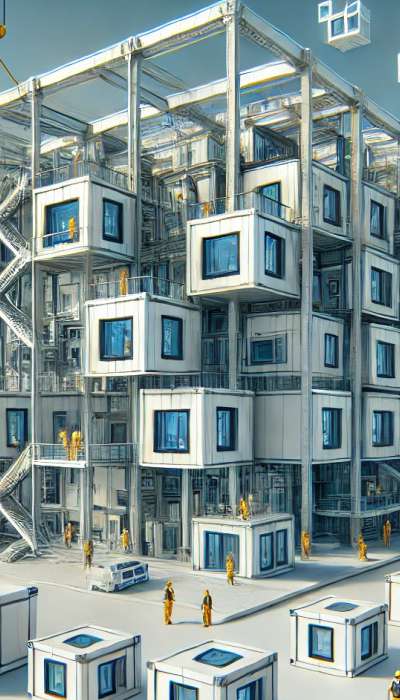
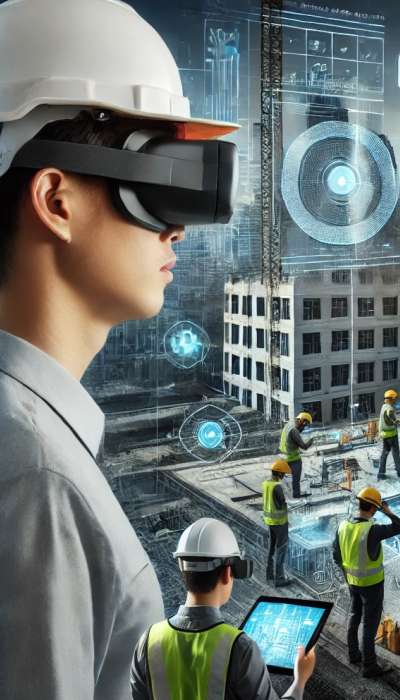


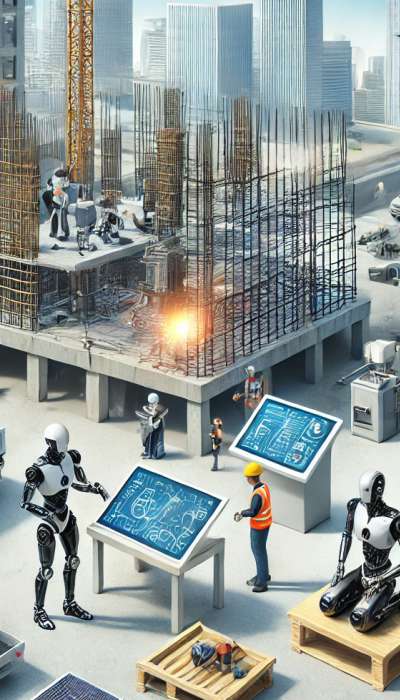
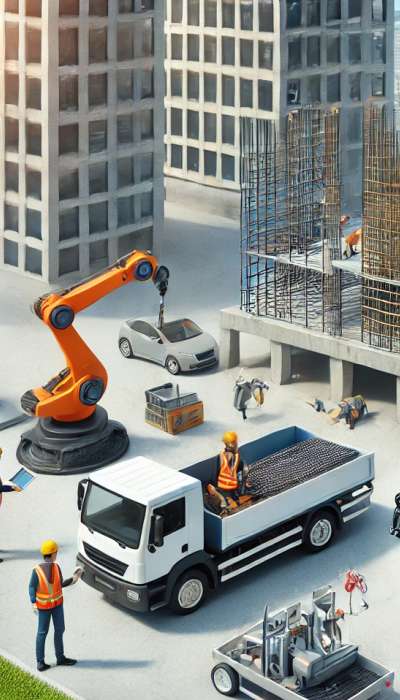
World of Concrete (WOC)
Held every year in Las Vegas, World of Concrete is the premier event for the concrete and masonry industries. It features exhibits, educational sessions, and hands-on training, showcasing the latest products, technologies, and innovations in the industry.
International Builders’ Show (IBS)
Organized by the National Association of Home Builders (NAHB), IBS is one of the largest annual light construction trade shows in the world. It offers exhibits, education, and networking opportunities focused on building products and technology.
bauma
Held in Germany every three years, bauma is the world’s leading trade fair for construction machinery, building material machines, mining machines, construction vehicles, and construction equipment. bauma attracts industry professionals from around the globe. Now there is a whole network of bauma trade fairs, including bauma CONEXPO INDIA, bauma CONEXPO AFRICA, bauma CTT RUSSIA, M&T EXPO, and now bauma China.
The Big 5
The Big 5 is the largest construction event in the Middle East, held annually in Dubai. It features a comprehensive showcase of construction products, services, and technologies, along with conferences and workshops on industry trends and innovations.
Autodesk University (AU)
AU is an annual event that brings together professionals from architecture, engineering, and construction to learn about the latest Autodesk software and technologies. It includes classes, keynotes, and networking opportunities.
Greenbuild International Conference and Expo
Greenbuild is the world’s largest event dedicated to sustainable building. Held annually, it features educational sessions, a vast expo floor, and networking events focused on green building practices and technologies.
Digital Construction Week (DCW)
DCW is a leading event in London focused on digital construction, BIM, and innovative technologies. It includes a conference, exhibition, and workshops that explore how digital tools are transforming the construction industry.
Smart Cities Expo World Congress
Held annually in Barcelona, Smart Cities Expo World Congress brings together leaders from various sectors to showcase innovative solutions for creating smarter, more sustainable cities. It covers topics like IoT, urban planning, and construction technology.
AGC Convention
The Associated General Contractors of America (AGC) Convention is an annual event that provides construction professionals with education sessions, networking opportunities, and an exhibition focused on the latest industry trends and technologies.
Construction Technology Forum
The Construction Technology Forum, typically held in the Middle East, brings together leaders to discuss the latest construction technologies and innovations. It includes presentations, panel discussions, and networking.
International Construction Week (ICW)
ICW, held in Malaysia, is a major event that highlights innovations in the construction industry. It features exhibitions, conferences, and business matching sessions that connect professionals with new technologies and opportunities.
Geo Week
Geo Week combines the International Lidar Mapping Forum, ASPRS Annual Conference, and MAPPS Winter Conference into a single event focused on geospatial technologies. It includes exhibits, workshops, and networking opportunities for professionals in the construction and geospatial industries.
AEC Next Technology Expo + Conference
AEC Next Technology Expo focuses on the latest technologies for architecture, engineering, and construction. It includes an expo floor, educational sessions, and networking events that highlight innovations in construction technology and project management.
World Sustainable Built Environment Conference (WSBE)
WSBE is a global conference series focused on sustainable building practices and technologies. It provides a platform for researchers, practitioners, and policymakers to share knowledge and advance sustainability in the built environment.
Global Infrastructure Forum
Organized by the World Bank, the Global Infrastructure Forum brings together public and private sectors to discuss infrastructure development, financing, and innovations. It covers a wide range of topics, including construction technology and sustainable infrastructure.
Future of Construction Summit
The Future of Construction Summit explores the latest trends and technologies shaping the future of construction. It features speakers, panel discussions, and networking opportunities focused on innovation and digital transformation in construction.
International Conference on Advances in Construction Machinery and Equipment
The International Conference on Advances in Construction Machinery and Equipment, typically held in Asia, focuses on the latest advancements in construction machinery and equipment. It includes sessions, demonstrations, and networking for industry professionals.
Lean Construction Institute (LCI) Congress
LCI’s annual congress in the U.S. brings together industry professionals to discuss lean construction principles and practices. It includes presentations, workshops, and networking sessions aimed at improving project delivery and efficiency.
Building Innovation Conference & Expo
Hosted by the National Institute of Building Sciences, this event in the U.S. focuses on innovation in building practices and technology. It features educational sessions, an expo, and networking opportunities for construction professionals.
These top 20 events, ranging from international exhibitions to specialized conferences, provide construction professionals with unparalleled opportunities to stay abreast of the latest trends and innovations in the industry. By participating in these gatherings, you can gain valuable insights, forge connections with industry leaders, and explore cutting-edge technologies that are transforming the construction landscape.
Whether you are looking to enhance your knowledge, discover new products, or network with peers, these events offer the perfect platform to drive progress and innovation in your projects and organizations.

Leading Training, Education, and Certification Providers
In the dynamic and rapidly evolving construction industry, continuous learning and professional development are critical for staying ahead of the curve. As technology and innovation reshape the way we design, build, and manage projects, it is essential for construction professionals to acquire the latest skills and knowledge. Here, we present a curated list of the top 20 training programs, courses, and certifications that provide comprehensive education in construction technologies and innovations.
These programs are designed to enhance your expertise, improve project outcomes, and position you as a leader in the field.
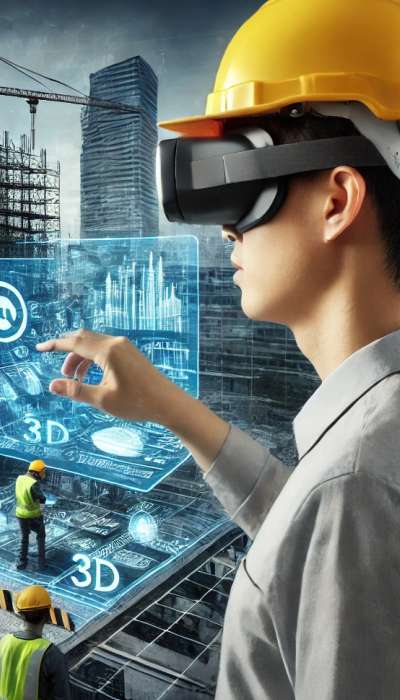
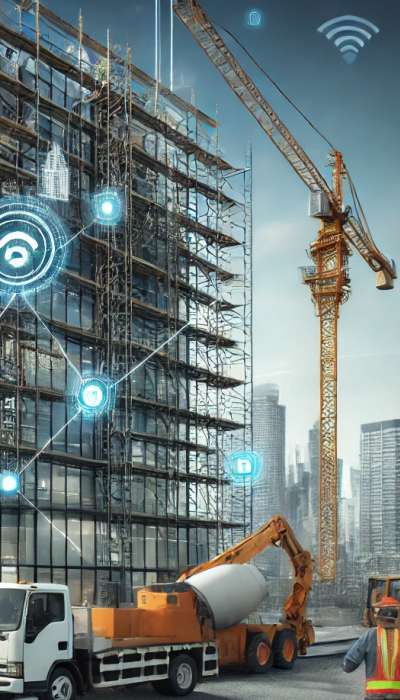
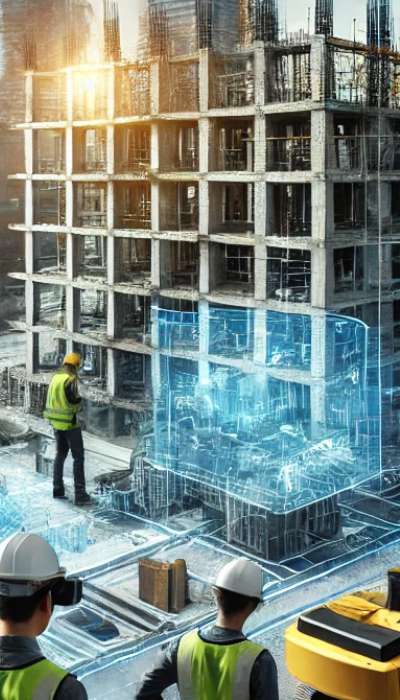
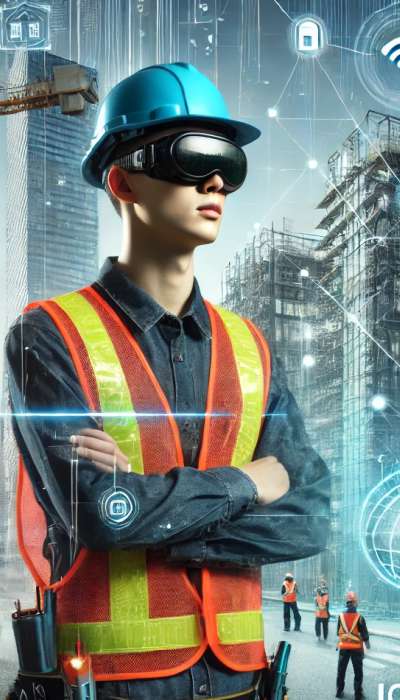

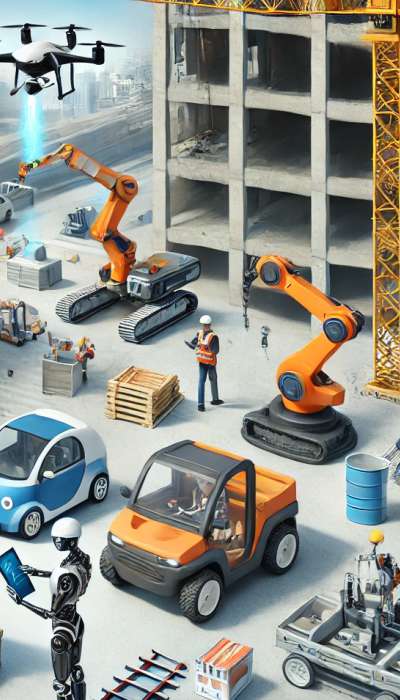

Autodesk Certified Professional (ACP)
Autodesk offers certifications for professionals seeking to validate their skills in Autodesk software, including AutoCAD, Revit, and BIM 360. These certifications demonstrate proficiency in using Autodesk tools for design and construction management.
LEED Accreditation (USGBC)
The U.S. Green Building Council (USGBC) offers LEED (Leadership in Energy and Environmental Design) accreditation for professionals committed to sustainable building practices. LEED credentials include LEED Green Associate and LEED AP, focusing on various aspects of green construction and building operations.
Project Management Professional (PMP)
Offered by the Project Management Institute (PMI), the PMP certification is widely recognized in the construction industry. It validates a professional’s ability to manage projects effectively, including those involving advanced construction technologies and innovations.
Certified Construction Manager (CCM)
The Construction Management Association of America (CMAA) offers the CCM certification, which recognizes professionals who have demonstrated knowledge and expertise in construction management, including the application of technology in project planning and execution.
Building Information Modelling (BIM) Certification
Various institutions offer BIM certification programs, including the Associated General Contractors of America (AGC) and the Royal Institution of Chartered Surveyors (RICS). These programs cover BIM fundamentals, advanced techniques, and practical applications in construction projects.
Lean Construction Certification (LCI)
The Lean Construction Institute (LCI) offers certification programs in lean construction principles and practices. These programs focus on improving efficiency, reducing waste, and leveraging technology to enhance project delivery.
RICS Digital Built Environment Courses
The Royal Institution of Chartered Surveyors (RICS) offers a range of courses on digital construction and the built environment. These courses cover topics such as BIM, digital twins, and smart construction technologies.
Construction Engineering and Management
Offered by universities, this online specialization covers key aspects of construction engineering and management. It includes courses on project management, construction technology, and sustainable building practices.
OSHA Safety and Health Training
The Occupational Safety and Health Administration (OSHA) provides training programs focused on safety and health in the construction industry. These programs include specific courses on using technology to enhance safety on construction sites.
Procore Certification
Procore offers a certification program for its construction management software. The program includes training on project management, quality and safety, and field productivity, helping professionals maximize the use of Procore’s tools.
Six Sigma Certification
Six Sigma certification programs, such as those offered by ASQ (American Society for Quality), focus on process improvement and quality management. These skills are valuable for construction professionals looking to enhance project efficiency and implement innovative solutions.
Harvard Graduate School of Design Executive
Education Harvard offers executive education programs in design, construction, and real estate. These programs cover cutting-edge topics such as sustainable design, digital technologies, and innovative project delivery methods.
University of Florida’s Rinker School of Construction Management
The Rinker School offers degree programs and professional development courses in construction management. Their curriculum includes advanced courses on construction technology, project management, and sustainable construction.
MIT Professional Education – Architecture and Systems Engineering
MIT offers online courses and professional certificates in architecture and systems engineering, focusing on integrating advanced technologies into construction projects. These programs cover topics such as digital transformation and innovation in construction.
Georgia Tech’s Professional Master’s in Occupational Safety and Health (PMOSH)
Georgia Tech offers a professional master’s program focused on occupational safety and health in construction. The program includes coursework on safety technologies and innovations to improve workplace safety.
CIOB Chartered Membership (MCIOB)
The Chartered Institute of Building (CIOB) offers chartered membership for professionals in construction management. The program includes training and assessments on modern construction practices and the use of technology in the industry.
UCL Bartlett School of Construction and Project Management
University College London (UCL) offers advanced degrees and professional courses in construction and project management, emphasizing the integration of technology and innovation in construction practices.
Penn State Online – Master of Professional Studies in Geodesign
Penn State’s online geodesign program focuses on the use of GIS and other technologies in urban planning and construction. The curriculum includes courses on digital tools and their applications in sustainable development.
Columbia University – Construction Management Certificate
Columbia offers a construction management certificate program that includes coursework on the latest construction technologies and innovations. The program prepares professionals to lead projects with advanced technical and managerial skills.
Advancing your knowledge and skills in construction technologies and innovations is essential for staying competitive in today’s rapidly evolving industry. These top 20 training programs, courses, and certifications provide construction professionals with the expertise needed to leverage new technologies, improve project outcomes, and drive innovation in their organizations.
By investing in these educational opportunities, you can enhance your career prospects, contribute to more efficient and sustainable construction practices, and stay at the forefront of industry advancements.

We hope our exploration of Smart Construction, Technologies and Innovations has given you valuable insights into the latest trends and developments transforming the construction industry. From advanced digital tools and sustainable materials to cutting-edge robotics and smart technologies, these innovations are revolutionizing how we design, build, and manage our infrastructure.
Staying informed and embracing these advancements is crucial for professionals looking to drive efficiency, safety, and sustainability in their projects.
We encourage you to delve deeper into the resources, events, and training opportunities highlighted on this page. By investing in continuous learning and staying updated with the latest technological advancements, you can position yourself at the forefront of the construction industry.
Together, we can build a more innovative, resilient, and sustainable future. Thank you for being a part of this journey with Highways.Today, and we look forward to continuing to bring you the latest in construction technologies and innovations.












